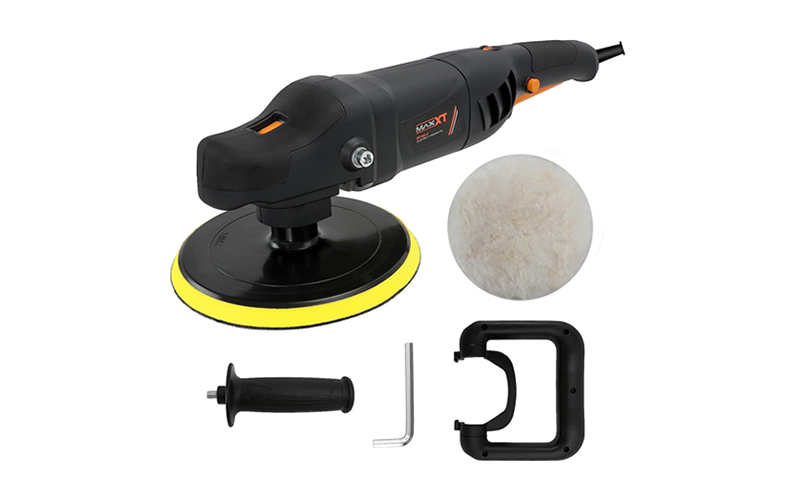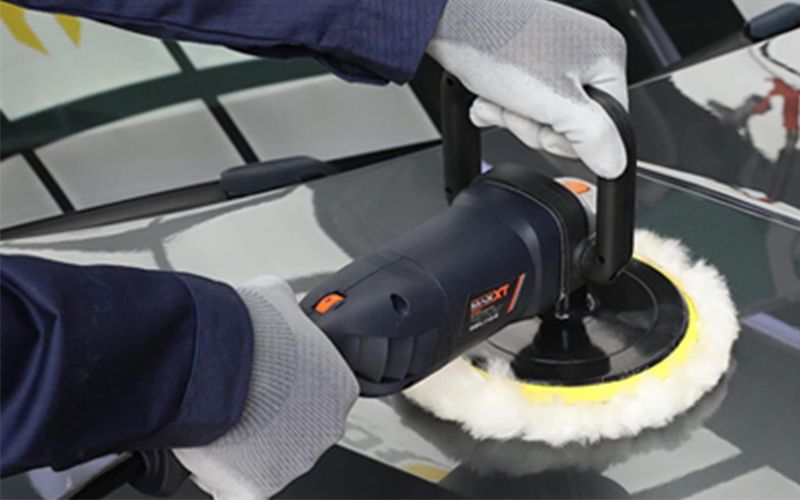Electric polishers have been a staple in the automotive industry for decades, providing a quick and efficient way to buff and shine cars. However, recent advancements in technology have led to the expansion of electric polisher applications beyond just cars. Today, electric polishers are being used in a variety of industries, including furniture manufacturing, woodworking, and even jewelry making.
One of the main benefits of using electric polishers in these industries is the time and labor savings they provide. Traditional hand polishing methods can be time-consuming and physically demanding, especially when working on larger surfaces. Electric polishers can significantly reduce the time and effort required to achieve a high-quality finish, allowing workers to complete projects faster and more efficiently.
Another advantage of electric polishers is their versatility. With a range of different attachments and pads available, electric polishers can be used for a variety of tasks, from removing scratches and blemishes to applying wax and polish. This versatility makes them a valuable tool in many industries, offering a cost-effective and efficient way to achieve a professional finish.
Elektrische Polierer verstehen
Electric polishers are an excellent tool for achieving a smooth, shiny finish on a variety of surfaces, including cars, furniture, and even floors. Understanding how electric polishers work and the different types available can help users choose the right tool for their needs.
Types of Electric Polishers
There are two main types of electric polishers: rotary and dual-action. Rotary polishers operate by spinning a circular pad at high speeds, while dual-action polishers oscillate and rotate the pad simultaneously. Each type has its own advantages and disadvantages.
Rotary polishers are more powerful and can remove deep scratches and imperfections, but they require more skill to use properly and can cause damage if not used correctly. Dual-action polishers are more forgiving and easier to use, making them a good choice for beginners or those who want to achieve a high-quality finish without the risk of damaging the surface.
How Electric Polishers Work
Electric polishers work by applying friction to the surface being polished, which removes a thin layer of material and creates a smooth, shiny finish. The polishing pad is typically made of foam or microfiber and is attached to the polisher’s backing plate.
To use an electric polisher, the user applies a small amount of polish to the pad and spreads it evenly over the surface being polished. The polisher is then turned on and moved in a circular motion over the surface, applying light pressure. As the pad spins or oscillates, it creates heat and friction, which breaks down the polish and removes imperfections.
Overall, electric polishers are a versatile and effective tool for achieving a high-quality finish on a variety of surfaces. By understanding the different types of polishers and how they work, users can choose the right tool for their needs and achieve excellent results with minimal effort.

Applications in the Automobile Industry
Electric polishers have found a wide range of applications in the automobile industry due to their efficiency, ease of use, and effectiveness. They have become an essential tool for car enthusiasts, car detailers, and auto shops to achieve a high-quality finish on cars.
Car Detailing
Car detailing is the process of cleaning, restoring, and finishing a car to make it look like new. Electric polishers are used to buff out scratches, swirl marks, and other imperfections on a car’s paintwork. They are also used to apply wax or sealant to protect the paintwork from the elements.
Electric polishers are preferred over manual polishing because they save time and energy while providing a consistent finish. They come with different pads and attachments, which can be used to reach difficult areas of the car’s body.
Restoration of Vintage Cars
Restoration of vintage cars is a meticulous process that requires a lot of attention to detail. Electric polishers are used to restore the paintwork of vintage cars to their original shine. They are used to remove rust, scratches, and other imperfections from the car’s body.
Electric polishers are also used to polish chrome and metal parts of the car, giving them a mirror-like finish. They can be used to restore headlights and taillights, making them look like new.
In conclusion, electric polishers have become an indispensable tool in the automobile industry. They are used for car detailing, restoration of vintage cars, and other applications. With their ease of use and effectiveness, they have revolutionized the way cars are maintained and restored.
| Pros | Cons |
| Saves time and energy | Can be expensive |
| Provides a consistent finish | Requires some skill to use |
| Can be used to reach difficult areas | Needs regular maintenance |
Expanding to the Furniture Industry
Electric polishers are not only useful for cars but also for furniture. The furniture industry can benefit from the application of electric polishers, especially for refurbishing wooden and metal furniture.
Refurbishing Wooden Furniture
Wooden furniture can easily be scratched or stained, and it can be challenging to restore its original beauty. Electric polishers can help to remove scratches and stains from wooden furniture, making it look new again. The electric polisher can be used with different types of polishing pads and compounds, depending on the type of wood and the severity of scratches or stains.
To refurbish wooden furniture, the following steps can be followed:
1.Clean the furniture with a damp cloth to remove any dirt or dust.
2.Apply a wood restorer or conditioner to the furniture.
3.Use the electric polisher with a medium-grit polishing pad and a wood polishing compound to remove scratches and stains.
4.Use a fine-grit polishing pad and a wood polishing compound to achieve a smooth and shiny finish.
5.Apply a wood wax or oil to protect the furniture from future scratches or stains.
Polishing Metal Furniture
Metal furniture can also benefit from the application of electric polishers. Metal furniture can easily become dull or rusty, and electric polishers can help to restore its shine and remove rust.
To polish metal furniture, the following steps can be followed:
1.Clean the furniture with a damp cloth to remove any dirt or dust.
2.Use the electric polisher with a metal polishing compound and a polishing pad to remove rust and restore shine.
3.Use a fine-grit polishing pad and a metal polishing compound to achieve a smooth and shiny finish.
4.Apply a metal wax or oil to protect the furniture from future rust or corrosion.
In conclusion, electric polishers can be used in the furniture industry to refurbish wooden and metal furniture. By following the proper steps and using the appropriate polishing pads and compounds, furniture can be restored to its original beauty.

Benefits of Using Electric Polishers
Electric polishers are versatile tools that can be used for a variety of applications, from polishing cars to furniture. Here are some of the benefits of using electric polishers:
Efficiency and Speed
Electric polishers are much faster and more efficient than traditional methods of polishing. With an electric polisher, you can cover a larger area in a shorter amount of time, making the polishing process much more efficient. This is especially useful when working on larger projects, such as cars or furniture.
Quality of Work
Electric polishers are also known for their ability to produce high-quality results. Unlike traditional methods of polishing, which can leave behind streaks and smudges, electric polishers are designed to produce a smooth, even finish. They are also great for removing scratches and other imperfections from surfaces, leaving them looking like new.
Overall, electric polishers are a great investment for anyone who wants to achieve professional-quality results. Whether you are working on a car, furniture, or any other project that requires polishing, an electric polisher can help you get the job done quickly and efficiently while producing high-quality results.
Challenges and Solutions
Safety Concerns
Electric polishers can be dangerous if not used properly. They can cause serious injury or damage to property if they are not used with caution. The following safety precautions should be taken when using electric polishers:
●Always wear protective gear, such as safety glasses, gloves, and a dust mask.
●Never use an electric polisher near water or other liquids.
●Make sure the power cord is in good condition and not frayed or damaged.
●Do not use an electric polisher if it has been dropped or damaged in any way.
●Always unplug the polisher before changing the pad or performing maintenance.
Proper Usage and Maintenance
To get the most out of an electric polisher, it is important to use it properly and maintain it regularly. The following tips can help ensure that an electric polisher performs at its best:
●Use the right pad for the job. Different pads are designed for different types of surfaces and tasks.
●Start with a low speed and gradually increase it as needed.
●Use the polisher in a back-and-forth motion, overlapping each pass slightly.
●Clean the pad regularly with a pad cleaning tool or by hand.
●Store the polisher in a dry, cool place when not in use.
Regular maintenance is also important to keep an electric polisher working properly. The following maintenance tasks should be performed regularly:
●Clean the polisher after each use.
●Check the power cord for damage or wear.
●Lubricate the bearings and gears as needed.
●Replace worn or damaged pads.
By following these safety precautions and maintenance tips, users can help ensure that their electric polishers are safe to use and perform at their best.
Abschluss
In conclusion, electric polishers have come a long way since they were first introduced as a tool for polishing cars. Today, they are being used in a wide range of applications, including furniture polishing, metal polishing, and even buffing floors. With the advancements in technology, electric polishers have become more efficient, powerful, and versatile, making them an essential tool for any DIY enthusiast or professional.
The benefits of using electric polishers extend beyond just saving time and effort. They also provide a more uniform and consistent finish, reducing the need for touch-ups and rework. Additionally, electric polishers are more environmentally friendly than traditional polishing methods, as they use less abrasive materials and produce less waste.
When choosing an electric polisher, it is important to consider the specific application and the type of surface being polished. Different types of pads and compounds are available for different surfaces, and choosing the right combination can make all the difference in achieving a flawless finish.
Overall, electric polishers are a valuable tool for anyone looking to achieve a professional-grade finish on their projects. With their versatility and efficiency, electric polishers are sure to continue expanding their applications in various industries.
